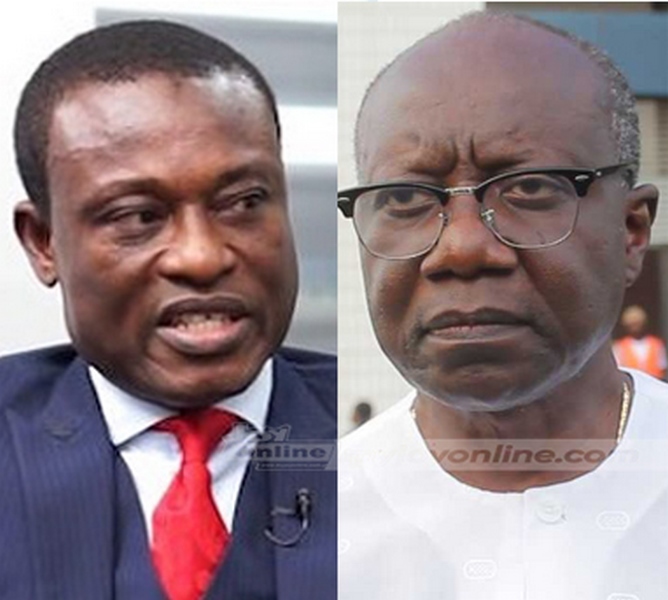When the Office of the Special Prosecutor signalled that Ken Ofori-Atta had become a “fugitive from justice” and sought an INTERPOL Red Notice, it set off a constitutional brawl.
From one vantage point, the Office of the Special Prosecutor (OSP )’s insistence on in-person appearance represents the uncompromising pursuit of procedural integrity; from another, it strikes like an overzealous power grab that crushes the presumption of innocence.
At its heart, this is more than a clash between a high-profile suspect and a determined anti-corruption agency—it is a test of whether Ghana’s rule of law can accommodate both rigorous investigation and the bedrock rights guaranteed under Article 19 of the 1992 Constitution which provides for fair trial of a person charged with a criminal offence. But, is Ken Ofori-Atta charged with a criminal offence? The OSP says, “No”.
Mr. Ofori-Atta’s journey from the rank of finance minister to “wanted” figure began in January 2025, when the OSP first notified him of five separate corruption inquiries and asked for his appearance on February 10.
His legal team responded with medical documentation of treatment abroad, offering remote cooperation but withholding a firm return date.
As successive deadlines passed—despite the appearance of biopsy reports and assurances of surgery—the OSP publicly framed each delay as calculated evasion.
By June 2, with no physical appearance and no unwavering travel plan, the OSP triggered an INTERPOL Red Notice, elevating the local standoff into an international theatre.
Legal experts, including Kofi Bentil, IMANI’s Vice President and the Director of Research Strategy and Communication at the OSP, Appiah Darko, clashed on JoyNews’ NewsFile June 7, 2025 edition.
Kofi Bentil immediately seized on this escalation as a constitutional crisis. He cautioned that treating a suspect as a fugitive for declining to attend an investigatory session dents Ghana’s guarantee of “innocent until proven guilty” (see clause 2c), risks trial by media, and sets a dangerous precedent for unfettered investigatory power.
Kofi Bentil insists that once evidence meets a threshold, the OSP should file formal charges in court and allow the accused to deploy every safeguard of a fair hearing—whether in person or, if necessary, in absentia.
In his view, due process serves as both shield and sword, protecting individuals from arbitrary state action while empowering the judiciary to adjudicate contested facts.
Samuel Appiah Darko offers a counterpoint grounded in procedural law and institutional mandate. He stresses that Ghanaian statutes forbid trial in absentia until a suspect has been formally arrested and charged (see clause 3). Absent that arrest, the OSP argues, there is no legal basis for proceeding in any forum—virtual or otherwise.
From this perspective, Ofori-Atta’s medical correspondence, arriving piecemeal and without a definitive travel schedule, did not satisfy the requirement of personal engagement with investigators.
To waive that requirement, Appiah Darko contends, would be to allow suspects to dictate the scope and timing of investigations, thereby eroding the OSP’s capacity to enforce anti-corruption statutes.
Put side by side, Bentil’s constitutional fervour and Darko’s procedural rigour reveal a deeper tension at the core of democratic governance. Kofi Bentil warns that the spectacle of a “wanted” man, known to be abroad and undergoing serious illness, risks turning legal instruments into political theatre.
Appiah Darko counters that rules without teeth invite endless delays and expose anti-corruption bodies to strategic manipulation.
Each stance carries merit: safeguarding fundamental liberties demands vigilance against prosecutorial overreach, yet empowering law enforcement to pursue complex financial crimes requires unwavering adherence to formal processes
Beyond this tug-of-war lies a wider reckoning for Ghana’s political and legal order. If the OSP prevails in narrowly demanding physical appearance before filing charges, suspects with the means to travel, or to secure staggered medical affidavits, could evade scrutiny indefinitely.
Conversely, if suspects can trigger in-absentia trials or binding remote interviews at will, investigative agencies may lose the authority to compel testimony and preserve vital evidence.
The balance struck here will ripple through future corruption probes, influence investors’ perception of Ghana’s governance, and shape citizens’ faith in impartial justice.
Regardless, the curtains are yet to be drawn on this drama. Will Ken Ofori-Atta return, risking immediate arrest and trial, or will the OSP’s Red Notice prove a hollow threat?
Might the interpretive jurisdiction of the apex court be invoked to clarify the interplay between Article 19’s fair-trial protections and the OSP Act’s investigative prerogatives? And could this saga prompt legislative reform—perhaps a Mutual Legal Assistance framework that marries remote cooperation with robust enforcement?
What began as a dispute over one man’s obligations has become a landmark moment for the rule of law. The next act of this legal drama will determine whether Ghana’s system emerges fortified or fractured under the glare of its own highest ideals.
Credit- IMANI’s Criticality Analysis of Governance Issues-June 1-7, 2025



